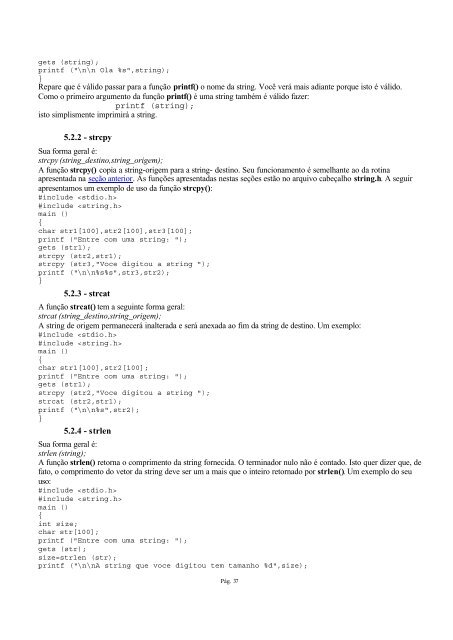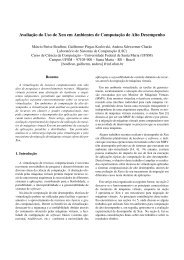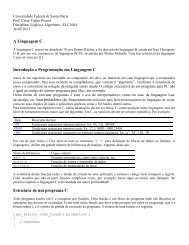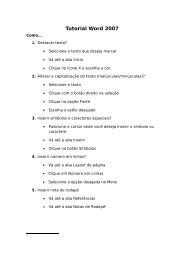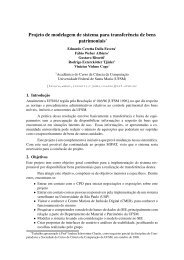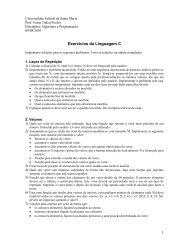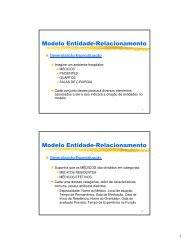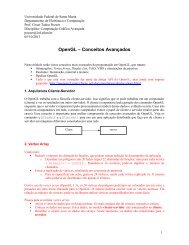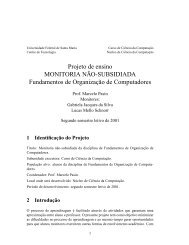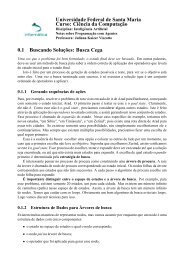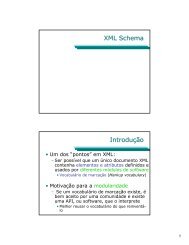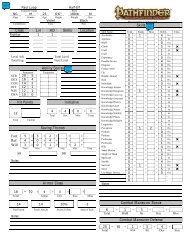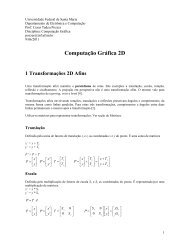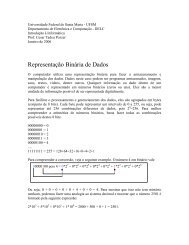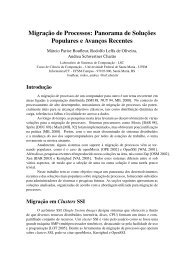Apostila C da UFMG - Universidade do Minho
Apostila C da UFMG - Universidade do Minho
Apostila C da UFMG - Universidade do Minho
Create successful ePaper yourself
Turn your PDF publications into a flip-book with our unique Google optimized e-Paper software.
gets (string);<br />
printf ("\n\n Ola %s",string);<br />
}<br />
Repare que é váli<strong>do</strong> passar para a função printf() o nome <strong>da</strong> string. Você verá mais adiante porque isto é váli<strong>do</strong>.<br />
Como o primeiro argumento <strong>da</strong> função printf() é uma string também é váli<strong>do</strong> fazer:<br />
printf (string);<br />
isto simplismente imprimirá a string.<br />
5.2.2 - strcpy<br />
Sua forma geral é:<br />
strcpy (string_destino,string_origem);<br />
A função strcpy() copia a string-origem para a string- destino. Seu funcionamento é semelhante ao <strong>da</strong> rotina<br />
apresenta<strong>da</strong> na seção anterior. As funções apresenta<strong>da</strong>s nestas seções estão no arquivo cabeçalho string.h. A seguir<br />
apresentamos um exemplo de uso <strong>da</strong> função strcpy():<br />
#include <br />
#include <br />
main ()<br />
{<br />
char str1[100],str2[100],str3[100];<br />
printf ("Entre com uma string: ");<br />
gets (str1);<br />
strcpy (str2,str1);<br />
strcpy (str3,"Voce digitou a string ");<br />
printf ("\n\n%s%s",str3,str2);<br />
}<br />
5.2.3 - strcat<br />
A função strcat() tem a seguinte forma geral:<br />
strcat (string_destino,string_origem);<br />
A string de origem permanecerá inaltera<strong>da</strong> e será anexa<strong>da</strong> ao fim <strong>da</strong> string de destino. Um exemplo:<br />
#include <br />
#include <br />
main ()<br />
{<br />
char str1[100],str2[100];<br />
printf ("Entre com uma string: ");<br />
gets (str1);<br />
strcpy (str2,"Voce digitou a string ");<br />
strcat (str2,str1);<br />
printf ("\n\n%s",str2);<br />
}<br />
5.2.4 - strlen<br />
Sua forma geral é:<br />
strlen (string);<br />
A função strlen() retorna o comprimento <strong>da</strong> string forneci<strong>da</strong>. O termina<strong>do</strong>r nulo não é conta<strong>do</strong>. Isto quer dizer que, de<br />
fato, o comprimento <strong>do</strong> vetor <strong>da</strong> string deve ser um a mais que o inteiro retorna<strong>do</strong> por strlen(). Um exemplo <strong>do</strong> seu<br />
uso:<br />
#include <br />
#include <br />
main ()<br />
{<br />
int size;<br />
char str[100];<br />
printf ("Entre com uma string: ");<br />
gets (str);<br />
size=strlen (str);<br />
printf ("\n\nA string que voce digitou tem tamanho %d",size);<br />
Pág. 37


